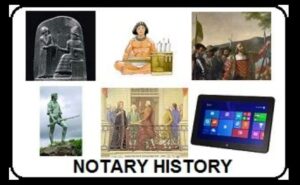Ancient Notaries

The earliest evidence of ancient notaries activities can be traced to ancient Egypt around 2750 BC, where scribes were entrusted with documenting official communications, including letters, proclamations, and tax records. These scribes played a crucial role in maintaining the administrative functions of the state, ensuring that transactions and governmental decrees were meticulously recorded.
Roman Developments
In ancient Rome, the notarial profession evolved further with the emergence of the scribae, public notaries or clerks who were integral to the administration. They were responsible for recording proceedings, transcribing state papers, and registering judgments and decrees. Another significant figure was the notarius, who took dictation and prepared minutes or memoranda of proceedings in shorthand. These roles were vital in a society where literacy was not widespread, and the accurate recording of legal and administrative matters was essential.
Medieval Transformations
During the Middle Ages, the function of notaries became more formalized. In the Eastern Roman Empire, notaries were pivotal in legal and court processes, especially as oral proceedings were uncommon and Roman legal traditions persisted. In Western Europe, particularly in regions like northern Italy and southern France, notaries played a crucial role in documenting private and public transactions, thereby preserving legal continuity through tumultuous times. Wikipedia
Notaries in England
In England, the history of notaries is intertwined with the Church. Initially, notaries were appointed by the Pope, and it wasn’t until 1279 that the Archbishop of Canterbury was authorized to appoint notaries. This ecclesiastical control highlights the importance of notaries in authenticating and preserving legal documents, a practice that was crucial in a time when legal frameworks were deeply connected to religious institutions. Wikipedia
Modern Notarial Practice
Today, notaries public continue to serve as impartial witnesses to the signing of documents, administering oaths, and performing other administrative functions. While the tools and specific duties have evolved, the core mission of notaries—to ensure the authenticity and integrity of documents—remains unchanged.City of Salem
For a more in-depth exploration of the history of notaries, you can refer to the original article on ancient notaries.
0 Comments